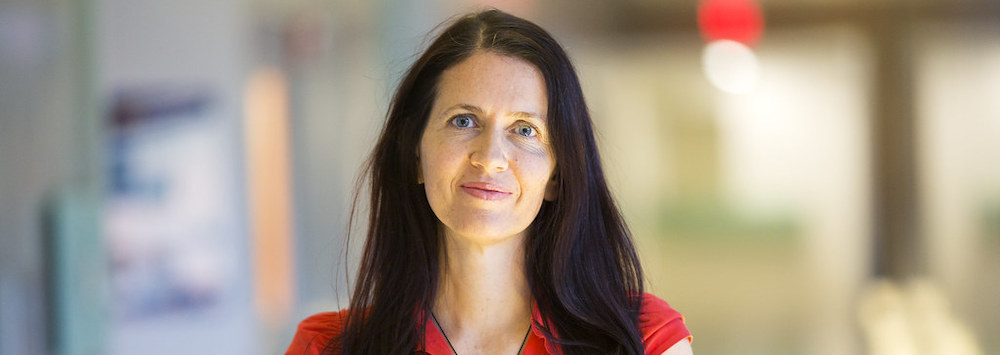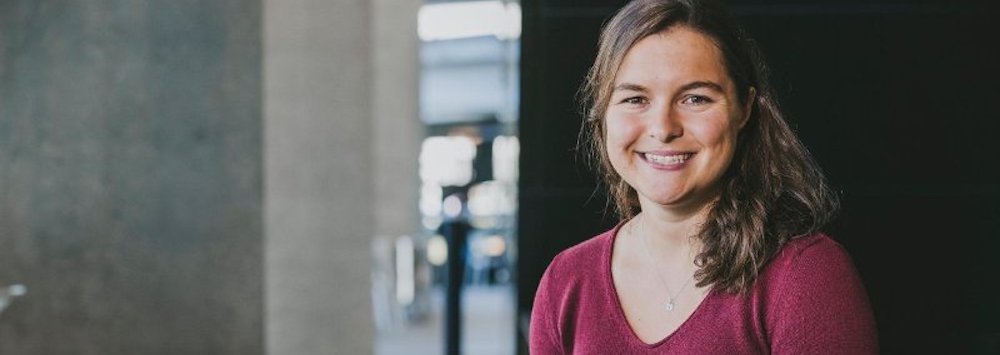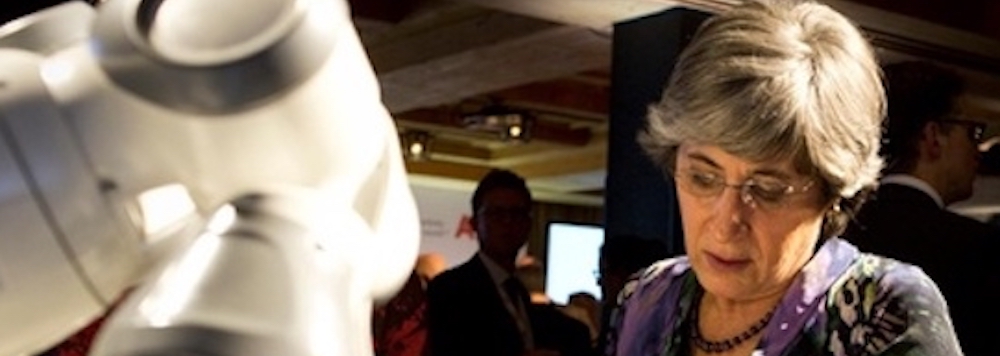AI is changing the world – everything from the way we shop for groceries to the way we hire people for jobs, but it doesn’t really reflect the world it’s changing. Wired estimates that only 12% of leading machine learning researchers are women, and we know that a lack of diverse AI researchers means that the technology they build skews towards a white and male default representation of the world, effectively reproducing and worsening existing human bias.
The technology that’s shaping our future needs to be built by people who represent the diversity of humanity, in order to ensure that the future is designed for all of us. Today we’ll start highlighting the many amazing women already doing inspiring work with Artificial Intelligence. In the first of a series highlighting women using technology to solve big problems, here are 5 women in AI you should know, sharing their work, their inspiration, and how they find problems they want to solve.

Dr. Manuela Veloso, Head of Machine Learning Department & Professor in the School of Computer Science, Carnegie Mellon University
Field of focus: Robotics, Autonomous Agents
Dr. Manuela Veloso is a renowned expert in artificial intelligence and robotics who is leading AI Research at JP Morgan, as well as the Herbert A. Simon University Professor in the School of Computer Science at Carnegie Mellon University and a former President of the Association for the Advancement of Artificial Intelligence (AAAI). Her work explores autonomous agents or AI systems that can observe, reason, and act on their own. She works with both autonomous robots as well as with software agents. She is well known for her work with soccer-playing robots, as well as autonomous robots called “service robots” which are capable of performing tasks for humans like driving people around buildings, taking them to particular locations, and picking up and delivering objects.
How she finds problems to solve
We asked Dr. Veloso about what inspires her, and how she finds problems she wants to solve:
“Problems that are hard are the most interesting ones, but are the ones that require more dedication, more persistence, more thoroughness. You become aware that when you are stuck in a difficult problem it’s both an opportunity to make a great discovery at the same time as it is frustration of being stuck”

 Dr. Rada Mihalcea, Director of Michigan AI Laboratory
Dr. Rada Mihalcea, Director of Michigan AI Laboratory
AI Focus: Natural Language Processing, Computation Sociolinguistics
Dr. Rada Mihalcea is a professor of Computer Science at the University of Michigan and the Director of the Michigan AI Laboratory. Dr. Mihalcea works in the field of Natural Language Processing – and more specifically, computational sociolinguistics. Through computational Socialinguistic techniques, Dr. Mihalcea explores ways to identify people’s values, behaviors, personality and worldviews based on the language they use. “For instance, based on what they write, can we tell what third graders care about, or what their mothers care about. Is family a high value for them, or friends, or achievement, or religion and so forth. We then explore how these values are reflected into behaviors.”
How she finds problems to solve
We asked Dr. Mihalcea how she finds problems she wants to solve using technology, and what inspires her.
“I am inspired by people. I like observing people in general, and I also do that in my research. A lot of the research that I do, although it is core computer science and language processing, it is really about people…To me AI is really about augmenting people. It can make a huge difference in how individuals and communities work.”

 Dr. Carolyn Rosé, Professor at Carnegie Mellon University
Dr. Carolyn Rosé, Professor at Carnegie Mellon University
Field of focus: Computational Sociolinguistics
Dr. Carolyn Rosé is a Professor in the Language Technologies Institute and Human-Computer Interaction Institute, where she researches conversation and language in order to build systems that can improve conversations between people and between people and computers. In particular, Dr. Rosé focuses on education and how we can use artificial intelligence to support students’ learning. Through one of her projects, she’s working to identify characteristics that would indicate people might work well together and then connect those people who share those characteristics.
How she finds problems to solve
We asked Dr. Rosé how she finds problems she wants to solve using technology, and what inspires her.
“I’m really inspired by commitment to excellence and persistence, even in the face of adversity. I like to run after a big question where there might not be an answer, but it’s fascinating. I’m also really inspired by people who are committed to doing something impactful in the world. I’m a researcher, so I try to find a problem that gives me the opportunity to learn something new to answer questions that haven’t been answered before. I would love children to get that sense of wonder and realize that scientists live in a world where there aren’t answers and that we’re comfortable with that.”

Dr. Chelsea Finn, Research scientist, Google Brain & post-doc, Berkeley AI Research Lab (BAIR)
Field of focus: Machine Learning and Robotics
Dr. Chelsea Finn is an Assistant Professor in Computer Science and Electrical Engineering at Stanford University, and part of the Google Brain team. Dr. Finn researches learning algorithms and how they can enable machines to acquire general intelligence that allows them to learn how to perform a range of tasks on their own. A recent project focused on building a robot that could perform different task (like picking things up or folding clothes) on many different objects without needing to be trained directly on each object.
How she finds problems to solve
We asked Dr. Finn what drew her to computer science and how she finds problems she wants to solve:
“One of the really nice things about computer science is that there’s just so much you can do with it. I realized that if I did biological engineering then my career would probably be in a bio-related field, but if I did computer science I could go into a bio-related field, or I could go into robotics, I could go into computer systems, I could go into security. I liked that flexibility, and I liked that computer science really empowers you to do a wide range of things. It leaves a lot of doors open.”
“In research you’re really trying to solve problems that no one has solved before, so you have to persevere and when things aren’t working then you come up with new ideas and move on, keep on trying.”

Dr. Fei Fang, Assistant Professor in the Institute for Software Research at Carnegie Mellon University
Field of focus: Multi-agent systems, integrating game theory and mechanism design with machine learning
Dr. Fei Fang is an assistant professor in the Institute for Software Research in the School of Computer Science at Carnegie Mellon University. Her research focuses on game theory and machine learning – including how we can use AI to address social challenges like environmental sustainability, how to use AI to improve infrastructure security, and how to improve transportation systems. Dr. Fang’s work addresses a range of issues that may look very different on the surface but share the common theme of relying on the strategic behavior of multiple agents. Game theory provides a framework to address each of these challenges.
How she finds problems to solve
We asked Dr. Fang about what inspires her, and how she finds problems she wants to solve:
“Here’s my feeling: there are a lot of societal challenges right now that can potentially be tackled by AI matters, ranging from poverty, food security to disadvantaged populations like homeless youth…there are many problems and there are many ways that AI can potentially be used to solve them, but we need more human resources like researchers and students and people in general to work on these problems”


